Peter MALONE
Saturday, 18 September 2021 19:27
Battle Hymn
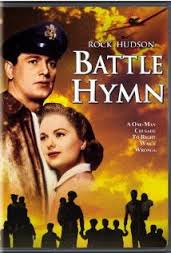
BATTLE HYMN
US, 1958, 108 minutes, Colour.
Rock Hudson, Martha Hyer, Anna Kashfi, Dan Duryea, Don Defore, James Edwards, Jock Mahoney, Alan Hale Jr.
Directed by Douglas Sirk.
One of many films made by Douglas Sirk with Rock Hudson in the mid-fifties, Magnificent Obsession, All that Heaven Allows, Written on the Wind. This is a Korean war film - with a difference because it treats of Dean Hess, a World War II pilot who became a preacher and re-enlisted for service in the Korean war.
The film has a religious background. It also has strong sentimental value because it presents a noble man, his relationship with his wife, his decisions about training Koreans and the clashes with his "worldly" friends, and his interest in helping Korean orphans.
Douglas Sirk has a strong reputation in America and France for his straightforward emotional storytelling especially in so many soap operas of the fifties. Battle Hymn would typify so many of the American conventions of heroism, American patriotism, sentiment and feeling and values. The score is of this nature as well and reinforces the feelings.
1. How enjoyable a film? American sentiment and feeling, the experience of war, the Korean war and American heroism and involvement? The criticism of war?
2. The use of Cinemascope and colour, the Korean atmosphere, the presentation of the battles? The air attacks? The score and its sentiment? The working in of American songs and patriotic music? (The significance of the title and the Battle Hymn of the Republic?) The film as a Rock Hudson vehicle and his style and appeal?
3. Korea and the view of the war in the fifties, American involvement, motives, the conduct of the war, patriotism, fighting, deaths? The introduction to the film and the explanation of Dean Hess's impact on his fellows? The dedication at the end?
4. Dean Hess and his memories of World War II, the stuck bomb and its dropping on the orphanage, his visiting the orphanage and the comments made about the orphan's death, his sense of failure as a preacher? his decision to re-enlist, the moment of decision on the hill, before going out to the service, his explanation to his wife? How credible an experience of such a man to make such decisions?
5. His arrival in Korea, his tough attitude and takeover, a man getting on with the job, Skidmore and the preparations for Hess's reputation and his shock, the skill in training the Korean pilots, his involvement in the war but not wanting to fight, his having to fight and kill in order to save?
6. The background of the orphans and their presence around the camp, their being in danger of being killed, their need for food, the Thanksgiving meal? Miss Yano, and her care for the children, the old man and his wisdom? The setting up of the temple area for the orphans? The humour of Herman's robbing supplies for the children? The happiness in the temple, the singing and dancing of the children? Hess's reparation for his killing of the orphans? Maples and his experience of strafing the children and his making reparation? The need for the orphans to be on the move, Miss Yang's death, Hess's saving so many children and getting them to safety? The orphanage at the end and the dedication?
7. Herman as Hess's assistant, roustabout, the ironical military touch to the proceedings? Skidmore and his criticisms, his jibes at Hess's being a preacher, his being guided in by Hess and the final prayer? The other men and their reaction to Hess, collaboration, the officials and their support?
8. The action in the air, the destruction of the convoy, Maples and his killing of the children? His grief, his talk to Hess and its effect on Hess's attitude?
9. Mary, her pregnancy, the letters, the phone call and Hess's reassuring her that he had understood why he was in Korea? Her presence at the end?
10. Miss Yang, her presence and her beauty, care for the children, her background, her story about the pines, her death for the child?
11. Themes of war and anti-war?
12. The presentation of human relationships - sentiment and feeling? A film of American sentiment and conventions? The fifties, now?
Published in Movie Reviews
Published in
Movie Reviews
Tagged under
Saturday, 18 September 2021 19:27
Battered / Intimate Strangers
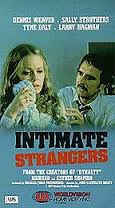
BATTERED (INTIMATE STRANGERS)
US, 1977, 100 minutes, Colour.
Dennis Weaver, Sally Struthers, Tyne Daly, Larry Hagman, Melvyn Douglas, Quinn Cummings.
Directed by John Llewellyn Moxey.
Battered is, as the title suggests, a film about violence in the home. Dennis Weaver portrays an ordinary man who experiences pressures at work and then beats his wife at home as compensation. Sally Struthers portrays the wife.
The film was nominated for an Emmy, was courageous in dramatising wife abuse in the late 1970s. Another film, The Burning Bed with Farrah Fawcett, made a great impact in the 1980s.
1. The quality of this telemovie? Production values? Gaining audience attention because of its theme and style?
2. The value of bringing social issues into the home? The effect on the varying members of the family audience? What influence does a film like this have? For home viewing, punctuated by commercials etc.?
3. The relevant information, statistics about wife-battering? Facts, emotional response to situations? Indications of groups for aid, legal procedures? The influence of change of law for women?
4. The initial presentation of the family, the balance between tension and love? The focus on Don and his buying the camper, money deals, his own self-esteem? The contrast with Janice and her seeming to be dumb? The ordinary children? The background of their fighting, blended with joy? Talk about battering, the indications for the drama to unfold? How well did the film get audiences to identify with the characters and thus with the themes?
5. The portrait of Don at work, the important policy, the questions of promotion of younger men, his relationship with Mort and their bragging, his self-reliance and moodiness against his boss? The moodiness of the loan of the policy? Its breaking out and battering his wife? The importance of the visit of the police and whether they should have pressed Janice to make charges? His avowals that he would change? The comment that a wife-batterer does not change and the danger extends to the children?
6. The portrait of Janice, how smart was she, how dumb? Her questions, inefficiency with the budget, nagging? Reacting to his night out? Her lying to the police after the battering? Her wanting to make up? The effect of the battering on the children as they watched? The visuals of Janice at the club and her friends seeing her, the phone number given from the battered wife?
7. The understanding of Don, home situations, work, bragging, money, the night out with the prostitute, jealousy at Karen's party? What motivated him? Why so moody and violent? The influence of his father?
8. Janice and the contrast with Karen? Literally bumping into her, the presentation of the divorced and career woman, her party and the people there and Janice's enjoyment, Don's resentment? The memories of the past and Karen's revelation of what Don and Janice were like? Her willingness to help? Her confrontation of Don with so much of the truth when she got Janice's clothes? The important discussion and Janice's accusing Karen of failure? Insight into marriage, divorce, reconciliation?
9. The importance of the sequences with Don's father, the explanation of the background, of his harshly being brought up, the present and his father dissatisfied in the home? His father bashing his mother? The ideals and the expectations set for Don?
10. The dramatic impact of the discussion groups and the points of view represented, pro and con women's rights, husbands', the responsibility and blame? Information about State laws? the warnings about repetition of bashing and Janice's dismay, her continual going back, the violence and her hurried leaving? hospitalisation?
11. Don, his arrest, his wanting to change, his trying to blackmail Janice emotionally? The significance of his conversation with Mort after being bailed out and his realization of his actions? Mort's disgust?
12. The build-up to the court case, Don's uncertainty and the significance of the final conversation and his admitting his fear?
13. The indefinite nature of the ending and leaving it to the audience to ponder? How convincing a film in themes and performance? How much influence in appreciating the problems of battering?
Published in Movie Reviews
Published in
Movie Reviews
Tagged under
Saturday, 18 September 2021 19:27
Barretts of Wimpole Street, The
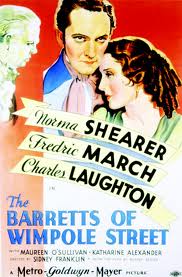
THE BARRETTS OF WIMPOLE STREET
US, 1934, 110 minutes, Black and white.
Norma Shearer, Fredric March, Charles Laughton, Maureen O’ Sullivan, Una O’ Connor.
Directed by Sidney Franklin.
UK, 1957, 105 minutes, Colour.
Jennifer Jones, Bill Travers, John Gielgud, Virginia Mc Kenna, Susan Stephen, Jean Anderson, Leslie Phillips.
Directed by Sidney Franklin.
The Barretts of Wimpole Street is based on a play by Rudolph Besier. It was adapted for the screen in 1934 and directed by Sidney Franklin. It had a very strong cast, Norma Shearer as Elizabeth Barrett, Fredric March as Robert Browning and, especially, Charles Laughton as Mr Barrett. Maureen O’Sullivan? was in the supporting cast.
Norma Shearer was nominated for an Oscar for this role (she had won an Oscar for The Divorcee in 1930). Fredric March had also won an Oscar for Dr Jekyll and Mr Hyde in 1932 and had appeared in such films as The Sign of the Cross. Charles Laughton had won an Oscar for The Private Life of Henry VIII and was soon to appear in Mutiny on the Bounty.
The film was criticised as being rather staid even though it looked lavish in its presentation of 19th century London.
Franklin had the opportunity to direct a widescreen colour version, using the screenplay from 1934. This time it was a British production with Jennifer Jones as Elizabeth Barrett and Bill Travers as Robert Browning (with his wife Virginia McKenna? as Henrietta). This time Mr Barrett is played with some subtlety by John Gielgud.
The second film is much more romantic than the first, with an English sensibility, especially in the cast, bringing to life the romance between the two poets under the eye of the disapproving father.
1. The impact of this story of a literary family and famous poets? Audience knowledge of Elizabeth Barrett and Robert Browning?
2. The re-creation of the Victorian period: costumes, décor, photography, musical score?
3. The literary style of the screenplay? Based on a play and opened out? How successfully – each version based on the same play and made by the same director with twenty years in between, the 30s film-making and the 50s?
4. The film as a romance, a tragedy? The place of women? Relationships within families – especially the psychology of a tyrannical and possessive father and the effect on his daughters?
5. What were the main characteristics of the Victorian atmosphere, the picture of family life, the relationship of brothers and sisters, the influence of the father, the norms for manners and behaviour, the clashes of will, the influences of power, the potential for suffering the need for rebellion? How stifling was the atmosphere? How well was this communicated?
6. How did the film successfully make Elizabeth central? Her relationship with her father, his dominance of her, the sequence on the drinking of port, Elizabeth as joyful central to her family, her relationship with Wilson, as ill, as pampered? Elizabeth as the poetess and her recitals of her poetry? The focus on the relationship between Elizabeth and Browning? by letter, in reality? The film having her reviving through her relationship with Browning? The change from fear to courage? The quality of her happiness and recovery? Her defiance? The power of love? The supporting of the brothers an and sisters? The goal of personal happiness? Was Elizabeth Barrett a convincing character and person of this film?
7. How important for the film and the impact was Mr Barrett? How did he embody the harsh aspects of the 19th century? His instilling of fear, pampering Elizabeth, making her better than she was, knowing all, his sour attitude to life, his harshness, his ruling his family, his blackmailing them emotionally, the length that he would go to keep his power? The effect of defiance on him? The importance of his revelation to Elizabeth about his hatred of marriage and love? (the contrast of emotion with his niece and the intensity of the kissing of his niece)? The effects of her decisions on him? His influencing Elizabeth to defy him? How sane was he? How moral?
8. The importance of Henrietta and the others, contrasting with Elizabeth? Lively people with squashed emotions, growing in love, needing support, yet fearful? The administering of the oath and Henrietta’s breaking it? The hatred for her father?
9. The portrait of 19th century servants, Wilson as a servant, faithful etc?
10. Comment on the way the film filled in the background of the family and the atmosphere, the cousins and the marriages, the doctors and their visits, walks and rides in the park?
11. What impact did Browning have in the film? As a forceful person like Barrett? Yet his humanity? A convincing poet? A man of forcefulness and charm? The good effects of his influence on Elizabeth?
12. How well did the film present insight into the family, love and hatred in family, power and domination, the destructiveness of selfishness?
13. What audience response to these themes did the film evoke? The emotional response of the audience in the area of freedom and obedience?
14. How enjoyable a film was this? How good a historical film? How important a thematic film of human life?
Published in Movie Reviews
Published in
Movie Reviews
Tagged under
Saturday, 18 September 2021 19:27
Baron Blood
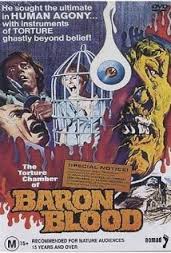
BARON BLOOD
Italy, 1971, 98 minutes, Colour.
Joseph Cotten, Elke Sommer, Massimo Girotti.
Directed by Mario Bava.
Baron Blood is a film by Mario Bava, a prolific director of horror films in Italy, especially Black Sunday. However, this is a rather tame affair with American star Joseph Cotten as an evil baron who is resurrected and continues the torturing he performed centuries earlier. The heroine is Elke Sommer who had appeared in a number of Italian horror films as well. Classic Italian director Massimo Girotti appears as the doctor.
The film is an example of the spaghetti horror film – which received a boost the following year after the release of The Exorcist and produced many imitations of that film including House of Exorcism with Telly Savalas.
1. Was this a serious horror film or partly tongue in check? Why?
2. Was the modern setting with its air of mystery a context for a horror story? Why?
3. Were Peter, his uncle and the others developed as characters or was this not important?
4. How fascinating are the stories of cruelty and evil in the past (including the popularity of films like this?)
5. Why was Peter curious? the incantation? Is there any credibility in such a thing happening in real life at all?
6. Was Baron Blood figure a horror character, the hideous make up, the subjective shots in the killings?
7. Was the film too callous in its presentation of the killing especially the servant in the spiked coffin?
8. Was the character of Alfred credible? When did you suspect he was Baron Blood? Why? What made you suspicious?
9. Were the chases and fights well done? What film techniques made them convincing?
10. How did the sequence of the visit to the woman add to the atmosphere?
11. Was the horror finale convincing, the torture, the recorded cries, reviving the dead, the new death of the Baron?
12. Why was the film fascinating and frightening? What is it in horror stories like this that captivates audiences: horror, cruelty, fear, superstition, the juggling with time?
13. Was this a well made horror film or just average and forgettable? Why?
Published in Movie Reviews
Published in
Movie Reviews
Tagged under
Saturday, 18 September 2021 19:27
Barefoot Contessa, The
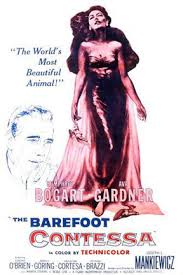
THE BAREFOOT CONTESSA
US, 1954, 128 minutes, Colour.
Humphrey Bogart, Ava Gardner, Edmond O'Brien, Marius Goring, Valentina Cortese, Rossano Brazzi, Elizabeth Sellars.
Directed by Joseph L. Mankiewicz.
The Barefoot Contessa was written and directed by Joseph L. Mankiewicz. Mankiewicz had had a successful career as a writer in Hollywood, culminating in Oscars for his work in All About Eve. He was to continue making films during the 1950s like Julius Caesar and Guys and Dolls. During the 1960s he spent a great deal of time and effort on Cleopatra with Elizabeth Taylor and Richard Burton.
The film has a Hollywood and film-making background. Mankiewicz had already treated themes of the American theatre in All About Eve. Humphrey Bogart portrays a down-and-out director who is asked by a millionaire to write and direct a film. He goes to Spain to find the actress Maria Vargas, played by Ava Gardner, to star in the film. The film shows the rapport between the writer and the actor but also shows the entanglements with two millionaires, one played by Marius Goring, the other a count played by Rossano Brazzi.
The standout in performance was Edmond O’Brien? as a press agent, winning an Oscar and Golden Globe as best supporting actor. Mankiewicz was nominated for both Oscar and Golden Globe and Writers’ Guild award for his screenplay.
Humphrey Bogart was coming to the end of his career. He had a very good year in 1954 with the release of both The Caine Mutiny and Sabrina. However, he was to contract cancer and made only four more films before his death in January 1967.
1. The main interest and application of this kind of film? Some consider it a classic. It was considered by many as very silly on its first release. Which opinion is more accurate?
2. The flashback structure and its importance for audience involvement and the distancing of the audience from the plot and values? for the development of Maria's character?
3. The values of the locations, the atmosphere of Hollywood, colour, how authentic did this world seem? How unreal?
4. The title? Maria's good and bad aspects, her initial independence from the film maker, (her talent as a dancer sufficiently communicated) her love relationships, ambitions, shrewdness in her American dealings, ultimate success? How interesting the tracing the successful part of her career?
5. How much of her life and ambitions were fantasy, dreams, fairy stories, the continual reference to Cinderella, Vincenzo as a prince charming?
6. Moving through the details of the Cinderella story, did the film have pathos? Cinderella in Barcelona, her parents, the murder of her mother, her father at the trial, her testimony and public opinion?
7. How much did she achieve in Hollywood? How deep was this achievement, how superficial? Hollywood's admiration of her, as a headline and a fashion?
8. The importance of her falling in love? The importance of her marriage, its relationship to her fantasies and stories?
9. How dramatic and real was her crisis? The impact of the truth? Her decision about a child? The irony of her love, of her death?
10. How important was mood for the film, the elegy of her funeral in the rain, the atmosphere of death? The irony of the audience’s lack of knowledge of how Maria died? Satisfaction when the truth was finally known?
11. The presentation of Harry as a sensible man, the irony of his career, his a drinking and failures, his failed marriages? Being put in the position of a 'yes man', becoming her friend and support, his relationship with Jerry? His being present at Maria's wedding? His warning to Lorenzo? The fact that Maria told him the truth? How real and interesting a character?
12. Muldoon and his values? the 'yes men', the commercial talk and the pressurising? His reaction to the trial and the publicity? His disillusionment with his own self and his job? The scene of his manoeuvring to change his job, his success? How interesting an exploration of a press agent?
13. The irony of the presentation of the producer, his wealth and arrogance? His succeeding, Harry's explanation of his background? The sequence of humiliation and losing out to Muldoon and Maria?
14. The presentation of wealth in Bravano? The cynical judgments in the film about the wealthy?
15. How sympathetic were Vincenzo and Eleanora? Vincenzo as a prince charming? The urbane Italian count? Why did he not tell the truth to Maria before the wedding? How reasonable the irrational shooting of her?
16. The themes of the film: human nature, the reality of fairy stories, success and ambitions? The contrast of the European and American themes? The insight in the film being about film making, stories, truth and fiction?
Published in Movie Reviews
Published in
Movie Reviews
Tagged under
Saturday, 18 September 2021 19:27
Barbary Coast
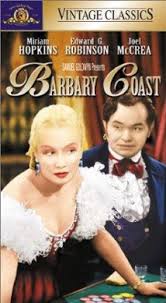
BARBARY COAST
US, 1935, 91 minutes, Black and white.
Joel Mc Crea, Miriam Hopkins, Edward G. Robinson, Brian Donlevy, Walter Brennan.
Directed by Howard Hawks.
Barbary Coast is a Howard Hawk's frontier film. Hawks, a noted director of action films with strong heroes and heroines, shows Miriam Hopkins here as his typical heroine, a survivor in a difficult frontier situation. Joel McCrea?, however. is a sturdier and laconic hero. Edward G. Robinson changes his locale but is the same as a gangster villain type. The film is somewhat dated now in its thirties' cinematic style and studio photography. However, it is a vigorous action piece about life in a frontier city and is interesting as an early film of Hawks who was to achieve such fame with Westerns like Red River and Rio Bravo.
1. An entertaining frontier film, action drama, human drama-romance? The reputation of Howard Hawks for tough action films and the standard of this film?
2. The conventions of the frontier Western and how well used? The arrival of the group in San Francisco, the way of life in San Francisco, the tough heroine and her linking up with the gangster, her love for the hero? Edward G. Robinson's style gangster and running of the town, his henchman, a law unto himself? Joel McCrea? as the sturdy hero? The conventional people in San Francisco - officers, police, gamblers? Miners? Satisfactory for this kind of adventure?
3. Black and white photography, studio locations? The score and the old American songs? The atmosphere of San Francisco, the mines, gambling etc.? Film-making of the thirties?
4. The plausibility of the plot - pioneering in San Francisco in the 19th century, the type of people there, out of the authority of the East, law and order? Men and women surviving in this kind of situation?
5. The audience entering the film with Swan? Her appearance on the ship, people's attention to her, her hopes for marriage? Her hardness emerging? Her surviving on arrival? Her association with Chamalis, working for him and yet despising him? Her influencing him especially as regards the newspaper? Her work at the gambling tables, the encounter with Carmichael in the rain and the talk about women with snakes in their hair, her encountering him in the casino, his losing his money, helping him, love? A strong heroine of the American West?
6. The contrast between Chamalis and Carmichael? Edward G. Robinson's style as Chamalis? tough, small, assumptions about running the town, using Knuckles for any killing, lording it over the authorities, his influence on the newspapers, the gambling? His overextending himself and his defeat? Carmichael as the strong silent type, honest, work in the mines, views on San Francisco and the Barbary Coast, disappointment with Swan, losing his money, working for Chamalis, love for Swan
and the ending?
7. Knuckles as the villain, the cold-blooded shootings, the lynching and the role of the vigilantes?
8. The portrait of the Barbary Coast and the various types presented? how well delineated: the miners and their coming to town to gamble, the Scotsman and his being shot, his friend? The Colonel and the running of the newspaper and his death? The officials?
9. How well presented was the atmosphere of the frontier in the 19th century? Its part of the heritage of the history of the United States? Influencing attitudes? Men and their ruggedness within this situation? Women and their survival? Love within this context? How well has the film stood the test of the decades?
Published in Movie Reviews
Published in
Movie Reviews
Tagged under
Saturday, 18 September 2021 19:27
Beau James
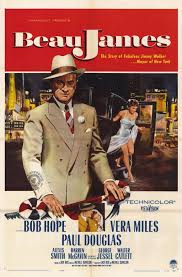
BEAU JAMES
US, 1957, 105 minutes, Colour.
Bob Hope, Vera Miles, Paul Douglas, Alexis Smith, Darren McGavin?, Joe Mantell, Horace McMahon?, George Jessell.
Directed by Melville Shavelson.
Beau James is a biography of the flamboyant mayor of New York, Jimmy Walker, who was mayor from 1926 to 1932. As a film made in the mid-50s, this is a rather sanitised portrait of the mayor. It is also sentimental but quite enjoyable.
Walker’s administration was opposed by James Seabury and Fiorello La Guardia who later became mayor of New York. There were issues of corruption, especially at the time of the Depression. Some said that Jimmy Walker himself was clean but stupid.
It is a surprise to see Bob Hope in the central role. While he brings his comic touch to the character, it is probably the most serious portrayal that Bob Hope did in a film. Vera Miles is Betty Compton with whom he had a relationship. Alexis Smith is his wife.
The film shows the workings of New York City – continuing in some of the traditions of corruption in New York (one thinks of the Scorsese treatment of the 19th century politics in New York City in Gangs of New York).
Jimmy Walker is supposed to have composed the lyrics to the song ‘I’ll Take Manhattan’. Direction is by Melville Shavelson, a popular director of entertaining films during the 50s and 60s with such examples as The Seven Little Foys (with Bob Hope as Eddie Foy), Houseboat, The Five Pennies with Danny Kaye, It Started in Naples with Clark Gable and Sophia Loren as well as On the Double (Danny Kaye), A New Kind of Love (Paul Newman and Joanne Woodward). He also directed a number of films for television during the 1970s.
1. How enjoyable a film? Bob Hope vehicle? Memoir of Jimmy Walker? The blend of these?
2. The importance of style, colour, the recreation of New York in the 20s and 30s? The atmosphere of New York at the time? The importance of Walter Winchell's commentary and memoir throughout? His final comments? The effect of the structure of the film as a memoir and glimpse of a man rather than a character study?
3. The emphasis on the New York opening, Jimmy Walker's songs and their repetition throughout the film, as a theme? The flavour of New York? the various places where Jimmy Walker went especially for baseball, St Patrick's day processions, Broadway etc? City Hall and the atmosphere of politics?
4. Bob Hope's characterisation of Jimmy Walker? The explanation of Walker's background pressure from his father, politics? The ambitions to be mayor of New York and what that meant in America at the time? The presentation of Walker as a stooge for the Democrats? the collage of the campaign? His reaction on actually receiving office? How did he remain a stooge, how did he break away? The criticisms by La Guardia in 1929 and their validity? Charlie's criticisms and Walker's confession at the end? The person of Allie and her support of politics, the failed marriage? her coldness towards him and yet her public support? her ever presence especially at Roosevelt's trial? The contrast with Betty, young, singing the song and Walker's reaction, her helping him home in his illness? Her being auditioned for the show and her reaction, the attack on Jimmy? Her response at the opening? Her decision to stay with him? His taking her out in public and the danger for his career? her realisation of this and her reaction? Her contriving of the scene between them and her going out, marriage and divorce? Allie walking away from him at the end with her comments on divorce and the church? Betty and her coming back to him? Did he love them both?
6. Walker as mayor, the good that he did, his stupidity, his going on holidays, not supervising things well, running a good show at the baseball? Appointing friends?
7. The portrayal of Chris Nolan and his support, his being the messenger boy from the politicians? Charlie and his straight talking, support, resignation, attack on his treatment of Roosevelt, his leading the applause at the end?
8. The portrait of Jimmy giving his jobs and administration to friends? Their seeming goodness, links with him, corruption? Deals? The importance of the exposure sequences?
9. The political future of Roosevelt? The crisis for Jimmy Walker and the St Patrick's Day procession? his personal feelings? The church? The various deals and his long speech defending himself? The consequences of Charlie's talk and his resignation at the baseball match?
10. The portrait of the aftermath? The return of Betty? His wandering and Walter Winchell's final comments?
11. A portrait of American personalities, types, dreams and hopes?
12. A glimpse of American politic& of the past? Comparisons with the present?
Published in Movie Reviews
Published in
Movie Reviews
Tagged under
Saturday, 18 September 2021 19:27
Beau Brummell
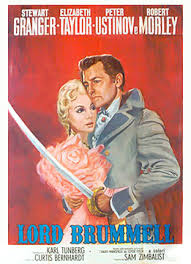
BEAU BRUMMELL
US, 1953, 113 minutes, Colour.
Stewart Granger, Elizabeth Taylor, Rosemary Harris, Peter Ustinov, Robert Morley, James Donald, James Hayter, Paul Rogers.
Directed by Curtis Bernhardt.
An entertaining historical romance. This kind of film has always been popular and was successful at the box office in the mid-fifties with the development of wide screen techniques and the need for colourful material. Stewart Granger in the early fifties had a successful period at M.G.M. as one of their leading heroes: King Solomon's Mines, The Prisoner Of Zenda, Scaramouche, Young Bess. Elizabeth Taylor added glamour - if not a particularly good performance. The supporting English cast of this film is excellent with Peter Ustinov outstanding as the Prince Regent and Robert Morley having a melodramatic brief appearance as the mad George the Third.
The film in its costumes and decor catches the atmosphere of post-Napoleonic regency England and high society. The screenplay also attempts to contrast the emerging 19th century and the possibilities of revolution in technical progress and life styles with that of the 18th century. The film does not have dramatic action but relies rather on audience interest in its hero and in the romantic sub-plot. Not so well received critically in the fifties, the film stands up well enough as an entertaining example of romantic historical drama.
1. The popularity of historical romances? Audience enjoyment of glimpses of history, insights into historical characters, the atmosphere and look of a period? Comparisons with other historical periods, with the present?
2. The historical romance and the parallel with the historical novel? How much truth? How much reality, fantasy? The romanticising of the past? George Brummell, a symbolic romantic hero from the early 19th century? The historical basis for this story? His representing lower classes and the emerging of a successful man in regency England? The influence on the English throne and the English customs? The portrait of George the Third, the Prince Regent? Romantic facts and romantic interpretation?
3. The treatment of the historical story: recreation of period and decor, costumes, pageantry? Buildings? The music and the atmosphere of Britain in the 19th century? The strong British supporting cast?
4. The theme of the place of the individual in Britain? Class distinctions? Money? Social position and success? The changes and equalising in British society? The individual and his opportunity? The background of Napoleon and his emerging from Corsica to lead France and try to dominate Europe? The contrast with George the Third and his mental deterioration, the decline of government in England? The Divine Right of Kings and its being challenged? Pitt and the political challenge? The Prince Regent and his Right to Rule? George Brummell as the individual with influence? The suggestions of some kind of peaceful social revolution? The background of Lord Byron and his romanticism and his presence in this film? A vision of successful England, the emergence of empire? The ironies of looking back at such vision with the history of Britain in the 19th and 20th centuries?
5. Stewart Granger's presence and style as George Brummell? The elegant and gallant gentleman? His role in the military? His confrontation of the Prince Regent as regards fashion and practicality? His being dismissed? The public attack on the Prince Regent in the street speech? The encounter? The advice and the build-up towards friendship? How convincingly was the development of friendship presented? The Prince Regent and his reliance on George, their being seen in public together? The clashes with Pitt and the politicking behind Pitt's moves? The Prince Regent's promise of an earldom to Brummell? The enemies trying to separate the two and suspicious of the Prince Regent? The various incidents which showed Brummell's influence on the court - their friendship with Mrs
Fitzherbert, the birthday party and the celebration, the hunting party and the toasts? Brummell's capacity for transforming the Regent from a fop to a substantial man, politician, potential king?
6. The contrast of the Prince Regent with Brummell - Peter Ustinov's appearance and style compared with that of Stewart Granger? The two Georges? The clash about the uniform, his pouting, the interview with Brummell and his hostility, his gradually listening to him, following his practical advice, delighting in his friendship? Exercise and diet? Reflection on Pitt, on the Divine Right of Kings, his future rule?
7. The sub-plot of the Lady Patricia and Edwin? Familiar material and its being integrated into the political plot? Elizabeth Taylor's style as Patricia? Her fascination with Brummell, slighting him, visiting him? The engagement and her decision to marry Edwin? The clashes as well as the passionate visits? Her final encounter with him and her pity for him? What might have been? Edwin and his role at the English court, friendship with the Regent? Clashes with Brummell? Trying to help Brummell at the end? The honourable Englishman?
8. The development of the bond between the Regent and Brummell? The hunting party, the engagement? Mrs Fitzherbert and her place at the court, her future if George became king? The importance of the sanity of George the Third and the various declarations? The scenes with Robert Morley and his brief indications of the unhinged monarch, his relationship with his sons, his sensing his victimisation, his death? The politicking about the limited Regency of George? Pitt's victory? The build-up to a clash with Brummell? The foolishness of the clash and neither being reconciled? The public insults especially about the fat friend?
9. The transition to Brummell's exile his illness and presence in Calais, the discussions about the book and his burning the manuscript? His sense of honour? The importance of James Hayter's portrayal of his loyal valet?
10. The visit of the Regent to Calais, the pomp and circumstance, Edwin and Patricia with him? The fight in the street and Brummell's loyalty? The procession passing by? The visit of the Regent and the reconciliation?
11. The portrait of Mrs Fitzherbert - her relationship with George, her place in the court, gossip and criticism, her not being allowed to be the Queen of England?
12. The sketch of Byron and his place in English society at the time - reputation, poetry, place in the aristocracy, friendship with Brummell, romanticism yet criticism of the times?
13. The film's indication of Pitt and his place as Prime Minister, the issues he was facing, his wisdom in estimating the Regent's character and Brummell's influence?
14. A satisfying historical romance as an entertaining story, a dramatisation of a particular period and its social and political issues?
Published in Movie Reviews
Published in
Movie Reviews
Tagged under
Saturday, 18 September 2021 19:27
Beat the Devil
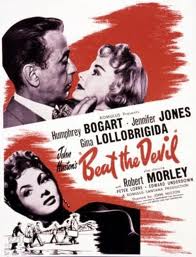
BEAT THE DEVIL
US, 1953, 89 minutes, Black and white.
Humphrey Bogart, Jennifer Jones, Gina Lollobrigida, Robert Morley, Peter Lorre, Edward Underdown, Ivor Barnard, Marco Tulli, Bernard Lee.
Directed by John Huston.
Beat the Devil has excellent credentials. It was written by Truman Capote years before In Cold Blood. It sparkles with verbal wit all the way through. It was directed by John Huston who had directed Humphrey Bogart in several films including the celebrated Maltese Falcon as well as Key Largo and his Oscar-winning performance in The African Queen. Bogart, who had only a few years to live after this film, is very good in a variation on his African Queen character – with a touch more sophistication.
The film has a gallery of rogues who are on a small ship bound for Africa, allegedly to sell vacuum cleaners along with a British couple played by Jennifer Jones and Edward Underdown. However, everything is not as it seems – all are after land with uranium in Africa. There are various complications, double-dealings, con tricks.
The film boasts an excellent international cast with a blonde Jennifer Jones in support of Bogart as well as Italian Gina Lollobrigida. Robert Morley and Peter Lorre are other members of the gang.
While the style of filming is that of the 1950s, the plot, the tricks and Capote’s dialogue are still worthwhile. John Huston made Moulin Rouge at this particular time and then went on to make Moby Dick and Heaven Knows, Mr Allison.
1. What did the title mean? What overtones did it have? How appropriate for this film?
2. How would you describe the tone of the film? How would you characterise the atmosphere of the film? Why? The use of black and white photography, music, squalid settings?
3. What was the genre of this comedy-adventure-parody- satire? How effective was the film in these areas? Why?
4. How did the film communicate its satiric points? By the genre? By the types and the characters? By their visual and verbal presentation? By the ironic situations? By the presentation of snobbery? How successful was this in idea? in execution? Is this a film where execution equals the ideas or not? Why?
5. How important was Humphrey Bogart as the central character? How much did the character rely on Bogart impressions and audience response to these? Previous Bogart films? villainy? The Americanism of Bogart? His nobility and yet his greed, his toughness and gentleness? His humour and his seriousness? What kind of character was Bitty? Was he a well drawn character? What were his endearing qualities? What was his villainy? How central was he to the rest of the film, and to the other characters? Why?
6. How did he contract with Maria? How typical an Italian character was Maria? The personality of Gina Lollobrigida? Maria’s importance for the film? her presence in the port? why she had married Bitty, why she was fascinated with Chelm, why she was fascinated with things English and snobbery? How realistic her character? Romantic? Idealistic? How humorous a character was she for the film?
7. How did she contrast with Gwendolyne? A blonde Jennifer Jones, stupid, telling lies? Her snobbery? The points behind her snobbery? Why was she at the port? Her relationship to Chelm? Love? Her love for Bitty in romantic hero film type? Her unreality? What did she add to the film?
8. Chelm himself? how were the English being satirised in him? What points about the English? How humorous was this? The attempt to kill him? His final vindication?
9. What did the film have to say about supporting characters? Peterson as personified by Robert Morley and his style? What he stood for ? Greed and pomposity? Duplicity? the major, small and murderous? Julius O'Hara and the satire on Peter Lorre, Germanic and Irish? The typical Italian villain? What did these villains all add to the film? Would it have been different without them?
10. The visual presentation of the seedy world of the port, uranium greed, the ship, the Arabs etc.? The point behind this? (More telling in the fifties than now?)
11. What did the film have to say about greed and double cross? The importance of the car going over the cliff, the attempts at murder, the changing of loyalties?
12. Comment on the irony of the whole film and its impact on audiences their laughing at villainy, at snobbery, at fickleness? To this extent how successful a satiric comedy was the film?
Published in Movie Reviews
Published in
Movie Reviews
Tagged under
Saturday, 18 September 2021 19:27
Beast in the Cellar, The
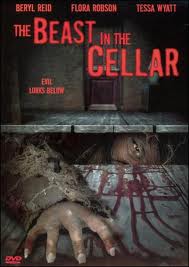
THE BEAST IN THE CELLAR
UK, 1971, 101 minutes, Colour.
Beryl Reid, Flora Robson, John Hamill, Tessa Wyatt, T.P. Mc Kenna, Vernon Dobtcheff.
Directed by James Kelley.
The Beast in the Cellar is one of the many horror films produced in England during the late 1960s, early 1970s. Hammer Studios had started the trend during the 1950s and several other studios, including Tygon, followed suit. They employed character actors in the leads and offered rather creative variations on popular themes, especially vampires, werewolves etc.
This film is a variation on the Arsenic and Old Lace story. Two elderly unmarried sisters, Beryl Reid and Flora Robson, keep their mad brother locked up in their cellar for over three decades. Then he escapes. There is a certain amount of mayhem but the film is strong on characterisation, especially from its leads.
The film was written and directed by James Kelley who directed only one more film after this, Night Hair Child with Mark Lester.
1. The appeal of this kind of horror film, themes, fantasies, lurking realities, morbidity?
2. The emphasis of the title and its horror, as explained throughout the film?
3. The film's structure and style: the English village, the types, the drama, the horrifying aspects of an ordinary village?
4. Expectations with the various murders, their beast-dog, their effect on people?
5. The film's focus on the two sisters? How well were their characters delineated, their similarities and differences, the interaction, the way that they guarded their brother, their protecting Alan? Were they mad in any way?
6. Joyce's injury, her dressing up as a soldier to see the brother, Ellie and her wanting to tell the truth?
7. Audiences not seeing Steven, the revelation, the horror? The explanation of what had happened, the monologue when Ellie told the truth? How dramatically satisfying? The plausibility of the story, of what the two sisters had done? How did the plot gain plausibility by the reality of the two
sisters?
9. The authenticity of the film with the extra characters, the police, soldiers, doctor etc.?
10. The message of the film? The final threat of death to Joyce, her terror, the death of Steven? The irony that he was not going to injure them? What value in human terms did the story have, as a horror film?
Published in Movie Reviews
Published in
Movie Reviews
Tagged under